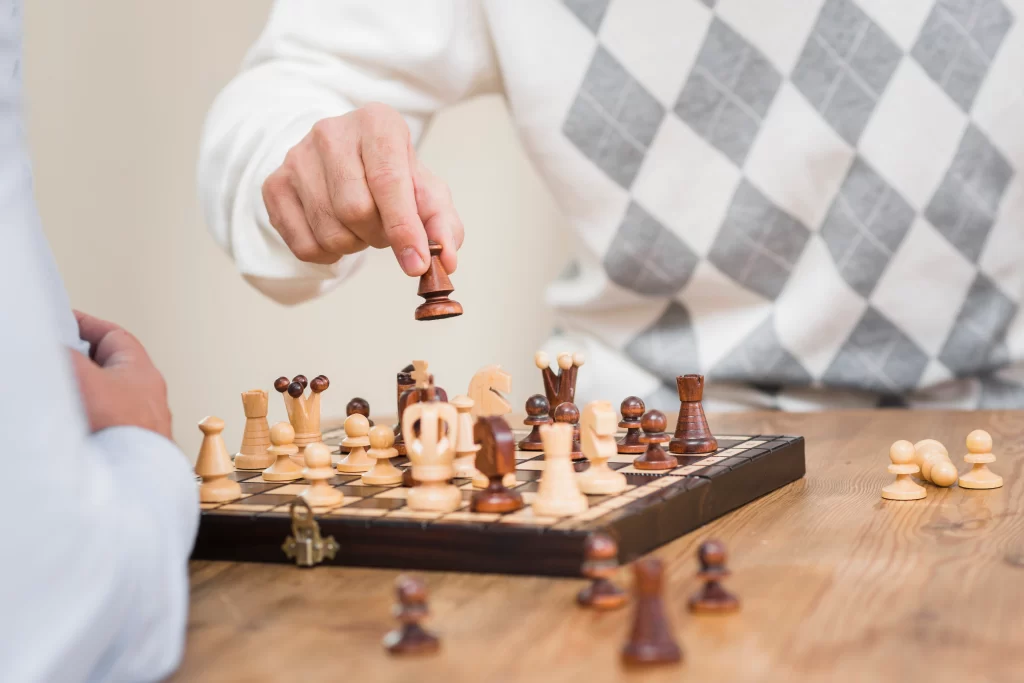Chess and Mindfulness: How Chess Teaches Focus and Present-Moment Awareness

In today’s fast-paced world, the quest for mindfulness and mental clarity is more pertinent than ever. While yoga and meditation are popular avenues for achieving this, there’s an age-old game that offers similar benefits – chess. Understanding how chess fosters focus and present-moment awareness reveals the profound connections between chess and mindfulness.
The Art of Concentration in Chess
Chess and Mindfulness
Chess is often hailed as a game of intellect and strategy. It demands a level of concentration that few other activities can match. Each move requires careful consideration, weighing the potential consequences several steps ahead. This deep concentration aligns perfectly with mindfulness practices, where the focus is on being fully present in the moment. Thus, chess and mindfulness are inherently connected through their emphasis on intense focus.
Focus and Present-Moment Awareness
In chess, distraction can be a player’s downfall. The game teaches players to block out external noise and zero in on the task at hand. This heightened focus on the present moment is a cornerstone of mindfulness. By consistently practicing this level of attention in chess, players can improve their ability to stay present and engaged in other areas of life as well. The principles of chess and mindfulness both stress the importance of staying in the now.
Chess as a Mindfulness Exercise
Cognitive Benefits, Mental Clarity, and Strategic Thinking
Playing chess is akin to a mental workout. It challenges the brain and enhances cognitive functions like problem-solving, critical thinking, and memory. Each move in chess is a deliberate action, made with full awareness of its implications. This deliberate action mirrors mindfulness exercises, where individuals perform activities with intentionality and awareness. Thus, integrating chess and mindfulness can significantly boost cognitive skills and mental clarity.
Moreover, chess requires players to fully engage with their current position and anticipate future moves. This mirrors the practice of mindfulness, where individuals are encouraged to remain aware of their current state while being open to the possibilities of the future. By intertwining chess and mindfulness, players can develop a more profound sense of awareness and strategic thinking.
The Intersection of Chess and Meditation
Mental Health, Stress Reduction, and Emotional Regulation
Like meditation, chess can be a tool for stress reduction and emotional regulation. The game provides a structured environment where the mind can find solace in strategic thinking. By immersing oneself in the game, players can experience a sense of calm and clarity, similar to the effects of meditation. Chess and mindfulness together can form a powerful practice for mental health.
Chess also teaches patience and discipline. Each game is a journey with uncertain outcomes until the end. This uncertainty requires players to remain calm and composed, even under pressure. These skills are invaluable in managing stress and maintaining emotional balance in everyday life. Practicing chess and mindfulness can thus lead to better emotional regulation.
Practical Tips for Using Chess to Enhance Mindfulness
1. Set Aside Dedicated Time: Treat your chess practice like meditation. Set aside a specific time each day to play chess, free from distractions.
2. Focus on the Process, Not the Outcome: Emphasize the importance of each move and the thought process behind it, rather than fixating on winning or losing.
3. Reflect on Your Games: After each game, take a moment to reflect on your moves, your thought process, and your emotional responses. This reflection can deepen your self-awareness.
4. Practice Mindful Breathing: Incorporate mindful breathing exercises before and during chess games to enhance focus and reduce stress.
5. Engage with a Chess Community: Joining a chess club, online classes, or community can provide support and encouragement, making your mindfulness practice more enjoyable and sustainable.
Summing Up
Chess and mindfulness may seem unlikely, but they share a profound connection. Both require deep focus, strategic thinking, and present-moment awareness. By incorporating chess into your mindfulness practice, you can enhance your mental clarity, reduce stress, and develop a greater sense of emotional regulation. So, the next time you sit down for a chess game, remember that you’re not just playing a game; you’re also nurturing your mind and spirit through the powerful combination of chess and mindfulness.
